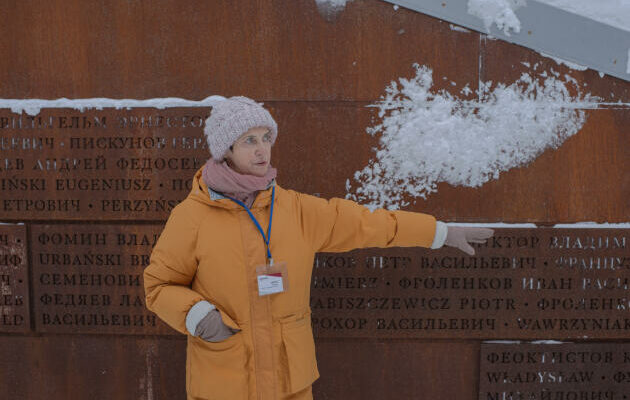Not a cloud or a bulldozer on the horizon. On this Saturday in December 2023, snow covers everything – the trees, the graves and the mass graves from which, between 1941 and 1943, the bodies of some 4,400 Polish officers were exhumed, executed at the foot of the pines, in the forest of Katyn. The snow even gives extra dignity to the place located not far from the Russian city of Smolensk, very close to the border with Belarus. It stifles the echo of threats coming from Moscow, the tumult of a country engaged in a complete revision of its history.
The guided tour of the memorial offers an impeccable account of the “tragedy” of Katyn, as the guide, Irina Popovitch, describes it. The responsibility of the Soviet Union (USSR), the partition of Poland between the IIIe Reich and the USSR, nothing is hidden, until the various manipulations of the Soviet side, at the end of the war, to place the responsibility for the massacre on Nazi Germany – one of them being to dress the corpses in winter clothes in an attempt to change the presumed date of the crime, committed in April-May 1940.
This historical rigor is notable, in a country where the evocation of the secret protocol of the Molotov-Ribbentrop pact of 1939 can lead to criminal prosecution for “rehabilitation of Nazism”. “More and more visitors are rebelling against our storynote also Mme Popovitch, who works for the “Katyn memorial complex ” since 2013. Some continue to blame the Germans; others ask: “And perhaps they didn’t do anything to us, the Poles?”…”
There are also these famous bulldozers: two columns left on April 10, 2022 from the neighboring town of Smolensk, stopping at the entrance to the complex, backhoe loaders raised in front of the memorial and barely veiled threats spat out through the megaphone: “We could destroy everything, but we are not Nazis. » “A private initiative”, assured the media, but that says enough of the atmosphere. To the rewriting of history initiated for a long time by Russian President Vladimir Putin, who only tolerates glory or martyrdom in the national narrative, is added the boiling of the war in Ukraine.
This hostile trip of tractors displaying Russian flags and “Z” stickers of the Russian “military operation” came a few days after the discovery of the bodies of civilians killed in Boutcha, Ukraine, north of Kiev – another massacre for which Moscow, indicted, denounces foreign manipulation, in this case that of “Western secret services”.
You have 75% of this article left to read. The rest is reserved for subscribers.
